 I received this book free from Baker Publishing for review purposes. I chose it because the synopsis excited me. We are a ministry family in a small New England town, and we are always seeking to honor the Lord more and more in our budget and stewardship. From the description, I believed the book was going to show me and my family how we could do just that. However, as I’ve been reading, I’ve come to see this as another book filled with all the ways that middle class Christians need to give up all they have to honor God with their finances.
I received this book free from Baker Publishing for review purposes. I chose it because the synopsis excited me. We are a ministry family in a small New England town, and we are always seeking to honor the Lord more and more in our budget and stewardship. From the description, I believed the book was going to show me and my family how we could do just that. However, as I’ve been reading, I’ve come to see this as another book filled with all the ways that middle class Christians need to give up all they have to honor God with their finances.
This book shares a lot of examples and stories of highly sacrificial churches and Christians, that were admirable and beautiful. But how many of us are called to downsize into an inner-city impoverished neighborhood to do ministry? What about those of us who stay in the suburbs, and minister to our neighbors there? I did not realize that this book was yet another social justice book, looking at how the church is failing the poor and underprovided for. I had so hoped it was a book aimed at helping me, as our family serves the Lord where He has called us and in raising our children to be godly men and women.
I also had a theological beef with this book. On page 104, the authors discuss the Lord’s Supper, referring quite clearly to the Lord’s Supper/Communion instituted by Jesus at His Last Supper. In describing how they believe Paul writes about how God wants us to fulfill that command in 1 Corinthians 11, they write, “The point wasn’t to stir up a bunch of hidden sin in the quietness of their hearts before they took the bread and wine; the point was to make sure the Supper that shaped the church’s entire life truly embodied God’s equally generous welcome to all who came, including the outcast and the poor…Paul emphasized getting the Lord’s Supper right because he believed the impact of that meal in the sacred space of the house-turned-church would ripple out into every aspect of the Corinthians’ lives. He believed a renewed Lord’s supper practice would, by God’s grace, form believers into people who would live lives of solidarity with the marginalized, show love for their neighbors, and embody generosity toward the ‘have-nots’.” Now let’s remember what Jesus said in Matthew 26 as He instituted the Lord’s Supper: “While they were eating, Jesus took bread, and when he had given thanks, he broke it and gave it to his disciples, saying, “Take and eat; this is my body.” Then he took a cup, and when he had given thanks, he gave it to them, saying, “Drink from it, all of you. This is my blood of the covenant, which is poured out for many for the forgiveness of sins.”
Christian hospitality is essential, and we should all grow in extending that to everyone we meet. But not at the expense of a correct understanding of God’s Word. This understanding of the purpose of the Lord’s Supper is central to 2 chapters of the book. And it is wrong. Paul himself says in 1 Corinthians 11 that if the Corinthians are hungry they should eat at home before coming to the Lord’s Supper, lest they eat and drink judgment on themselves. He has no notion that it is “God’s potluck”, intended to welcome and feed the community. It is intended for God’s people alone, and should be taught as such.
I was highly disappointed by this book. The authors have hearts for the Lord, and they are earnestly serving people generously and sincerely. However, that doesn’t necessarily qualify them to write a book to instruct others, and I don’t recommend this book.
 r many years and it has been such a gift to partner with other women to pray for our children. We moved to the northeast several years ago, and I haven’t had a group since then. Therefore, I was very excited to read Start with Praise, hoping it would be a boost to my prayer life and would encourage me in a season when I have felt that I am doing prayer battle for my family mostly on my own. And I am so happy to say this book did not disappoint me, it exceeded my expectations.
r many years and it has been such a gift to partner with other women to pray for our children. We moved to the northeast several years ago, and I haven’t had a group since then. Therefore, I was very excited to read Start with Praise, hoping it would be a boost to my prayer life and would encourage me in a season when I have felt that I am doing prayer battle for my family mostly on my own. And I am so happy to say this book did not disappoint me, it exceeded my expectations.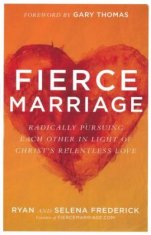 Where does a book on marriage begin? For Ryan and Selena Frederick it began very early in their own marriage with a huge health crisis. When you are faced with a life-or-death situation, you realize you will have to figure out where you stand on a lot of issues in a hurry. Having to learn in a hurry the lessons that many couples require decades to acquire, they were then in a great position to be able to counsel others in the lessons they have learned. The result is Fierce Marriage: Radically Pursuing Each Other in Light of Christ’s Relentless Love (Grand Rapids: Baker; 2018).
Where does a book on marriage begin? For Ryan and Selena Frederick it began very early in their own marriage with a huge health crisis. When you are faced with a life-or-death situation, you realize you will have to figure out where you stand on a lot of issues in a hurry. Having to learn in a hurry the lessons that many couples require decades to acquire, they were then in a great position to be able to counsel others in the lessons they have learned. The result is Fierce Marriage: Radically Pursuing Each Other in Light of Christ’s Relentless Love (Grand Rapids: Baker; 2018). I received this book free from Baker Publishing for review purposes. I chose it because the synopsis excited me. We are a ministry family in a small New England town, and we are always seeking to honor the Lord more and more in our budget and stewardship. From the description, I believed the book was going to show me and my family how we could do just that. However, as I’ve been reading, I’ve come to see this as another book filled with all the ways that middle class Christians need to give up all they have to honor God with their finances.
I received this book free from Baker Publishing for review purposes. I chose it because the synopsis excited me. We are a ministry family in a small New England town, and we are always seeking to honor the Lord more and more in our budget and stewardship. From the description, I believed the book was going to show me and my family how we could do just that. However, as I’ve been reading, I’ve come to see this as another book filled with all the ways that middle class Christians need to give up all they have to honor God with their finances.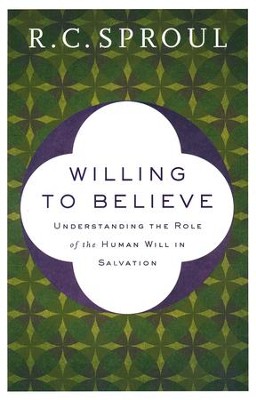 One of the most disputed aspects of Christian theology through the centuries has been the nature of man’s free will. To what extent is our will able one its own to accept and appropriate salvation? Must God supernaturally intervene to produce faith, or is that something that an individual can achieve on their own.
One of the most disputed aspects of Christian theology through the centuries has been the nature of man’s free will. To what extent is our will able one its own to accept and appropriate salvation? Must God supernaturally intervene to produce faith, or is that something that an individual can achieve on their own. Several years back, Albert Mohler
Several years back, Albert Mohler 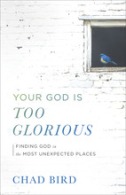
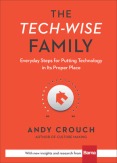 This book is small but packs a powerful punch. Andy Crouch writes from personal experience and conviction, in what has worked (or not worked) in his family as far as managing technology and its effects. It has numerous Barna research results expressed in varying graphics, including bar and circle graphs and sobering statistics.
This book is small but packs a powerful punch. Andy Crouch writes from personal experience and conviction, in what has worked (or not worked) in his family as far as managing technology and its effects. It has numerous Barna research results expressed in varying graphics, including bar and circle graphs and sobering statistics.
 OK, I’ll admit it. I’m not a fan of devotionals. In general, the genre produces 365 days of (whatever) which usually ends up being a single verse of the Bible yanked out of context and then a paragraph or two of “encouraging thoughts” … it’s the prefect lightweight fluff for the American church. I think devotionals are an important part of why the American church is so weak.
OK, I’ll admit it. I’m not a fan of devotionals. In general, the genre produces 365 days of (whatever) which usually ends up being a single verse of the Bible yanked out of context and then a paragraph or two of “encouraging thoughts” … it’s the prefect lightweight fluff for the American church. I think devotionals are an important part of why the American church is so weak.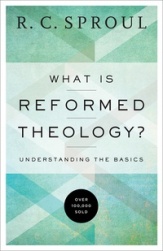 What is Reformed Theology? is a classic work by R.C. Sproul, reprinted with a simple but attractive new cover by Baker Books. Sproul wrote this work in 1997 and there really isn’t a need for a new edition of it. The Scriptures have not changed. The arguments for and against have not changed.
What is Reformed Theology? is a classic work by R.C. Sproul, reprinted with a simple but attractive new cover by Baker Books. Sproul wrote this work in 1997 and there really isn’t a need for a new edition of it. The Scriptures have not changed. The arguments for and against have not changed.